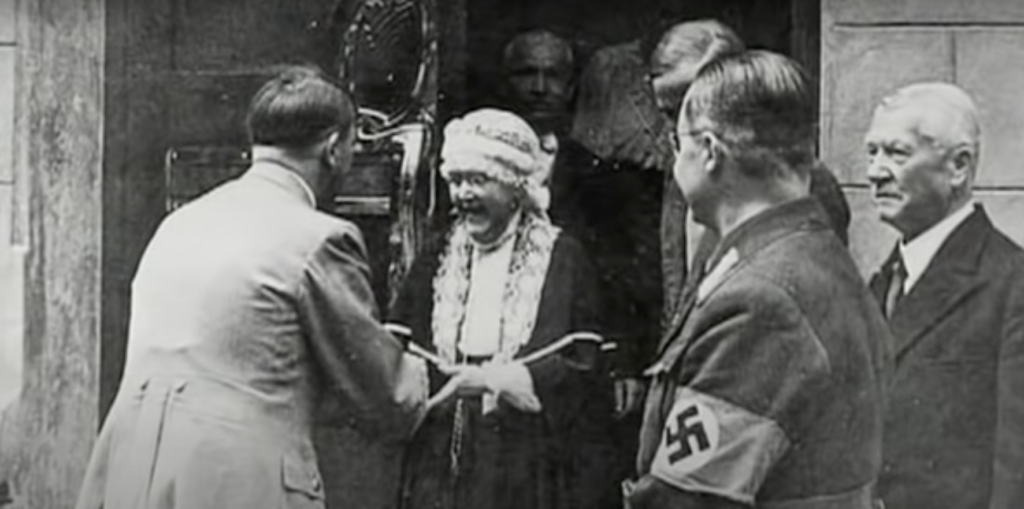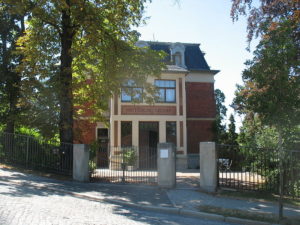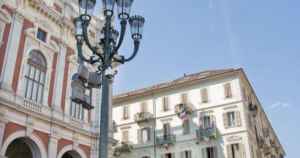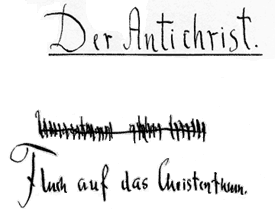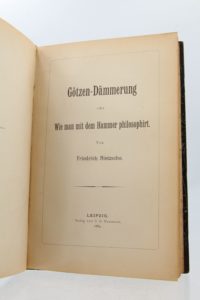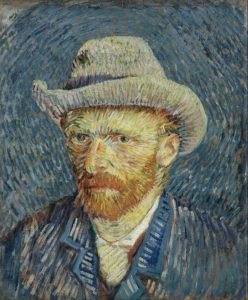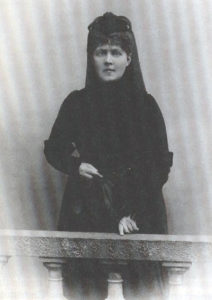against the Cross, 21
Sometime before he sent his mad letters, when Nietzsche was charring in Turin, he wrote Ecce Homo: How One Becomes What One Is, which no longer contains any new ideas. Ecce homo was only the presentation of his books under the delirium that he was soon to split history in twain. A few months later, when the martyr of the spirit was interned in the psychiatric hospital in Jena, Adolf Hitler was born. Nietzsche would later be taken by his mother to Naumburg. When her mother died, Elisabeth took her brother to Weimar, where he lived until 1900. The interior of that house, the Nietzsche Archive, can be seen in the video linked in my post this morning.
Adolf Hitler grew up, matured and, when he was already at the height of power, visited the house of the Nietzsche Archive. As a reward for the visit, Elisabeth gave him a relic: her brother’s walking stick!
Unfortunately Hitler didn’t win the war, so the West is now ruled by an anti-Hitlerian, anti-Nazi, anti-national, anti-White, anti-Gentile, anti-male and anti-heterosexual ideology. Because the Anglo-Americans ‘won’ the war, and told—and tell—the story that rules the West, I have to reiterate what I have so often said about the other side of the Wall.
Many among the racialist folk are actively deluding themselves by not recognising the Christian problem. The old saying ‘You can’t solve a problem if you can’t first define it precisely’ applies to those who believe that there is only the Jewish problem and not a Christian problem. Most racialists ignore the history of Constantine and his successors not only explained in some PDFs of our featured post, but even available in books still in print, such as The Darkening Age.
But the problem are all Westerners. From the mighty Woke liberals to the comparatively small racialist reaction, via traditionalist Christians, liberal Christians, agnostics and atheists, all find themselves bending the knee before the cross. Just look at the news these days: kids on the campuses fanatically worshipping the cross, imagining there the recently crucified Palestinian! At the opposite pole, those who belong to the anti-Semitic racial right also worship it, as can be seen in the number of articles in The Unz Review: both authors and commenters pity the same crucified Palestinian! Not to mention the traditional Christians who, literally every day, kneel in their churches in front of an image of the crucified rabbi.
While it is a breakthrough that one aspect of the Jewish Problem is finally beginning to be discussed—the state of Israel—what these people, Christians, atheists, liberals and white nationalists are unable to see is that it is impossible to win the battle by having the cross as the sign in the sky through which they will win. It is impossible to win with Christian ethics because it is a suicidal path that practises the most aggressive dysgenesis.
Unlike all of them, the National Socialists at the top of the Third Reich repudiated not only anti-racism but the very essence of what it means to kneel before the Cross: that a crucified victim is, by definition, morally more worthy than the crucifying Romans. That is why Himmler gave texts about Genghis Khan to the SS: to prepare them psychologically about what, once values are transvalued, we have to do.
Nietzsche was dazzled when he saw how Christians inverted Greco-Roman values through precisely the symbol of the cross:
This reminds me again of the invaluable words of Paul. ‘The weak things of the world, the foolish things of the world, the base things of the world, and the things that are despised, hath God chosen’: this was the formula; decadence was victorious in hoc signo – God on the cross –. Have people still not grasped the gruesome ulterior motive behind this symbol? – Everything that suffers, everything nailed to the cross is divine… Christianity won, and with this, a nobler sensibility was destroyed, – Christianity has been the worst thing to happen to humanity so far. – – [The Antichrist, §51]
The Christianity of Nick Fuentes and the rest of the white nationalists who fantasise about a new religious awakening in their country won’t save the Aryan man from extinction. We already saw what happened when the Iberian Christians conquered the Americas: they immediately became mongrelised despite their Jew-wise Inquisition. Fuentes and company will never save us because the one nailed to the cross was the rebel who raised his hand against Rome; more recently the slave that the English liberated, last century the holocausted Jew, the black American; this century the deranged transexual, etc., and the bad Aryan is supposed to have crucified him.
I would like to end this series with the plea that Nietzsche’s self-immolation after running towards the sun was not in vain.
Let us begin a movement parallel to American white nationalism: a movement in which, though minuscule for the moment—The West’s Darkest Hour—we have already taken up the crusade against the cross!
It’s time to show the nationalists that there is a higher idea than the dumb and stubborn monocausalism they preach. What does it matter if so few people visit this blog, or that hardly anyone comments on the discussion threads of my posts? What matters is to plant the insignificant—microscopic I dare say!—mustard seed in the hope that it will eventually grow and compete with the plant planted two millennia ago by Saul of Tarsus—the worst thing to happen to humanity so far!
I teach you the Overman. Man is something that shall be overcome. What have you done to overcome him?… The time has come for man to set himself a goal. The time has come to plant the seed of his highest hope. —Thus Spake Zarathustra
